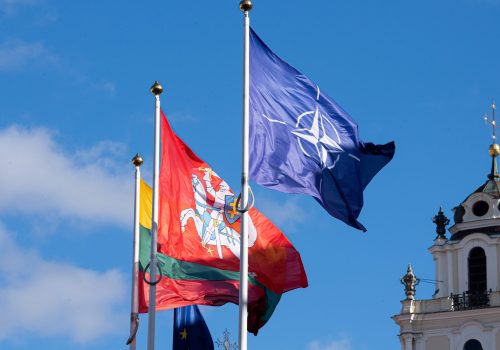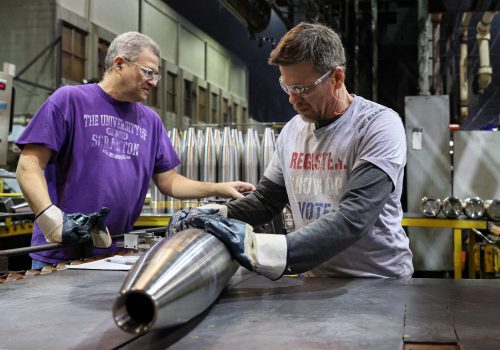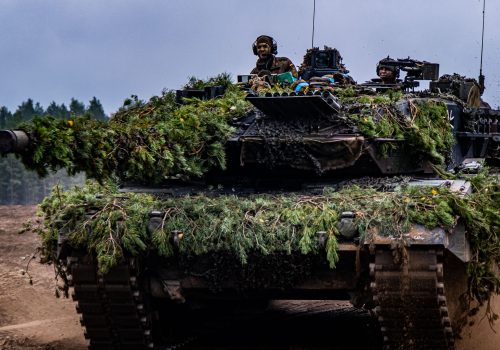Restocking US and allies’ arsenals starts with getting industry involved at the NATO summit
Defense industry chief executive officers and the leaders of NATO members and partner countries need to have an urgent discussion about insufficient stockpiles of ammunition and equipment. The NATO Leaders’ Summit July 11-12 in Vilnius, Lithuania, is a perfect opportunity to bring them together.
NATO Secretary General Jens Stoltenberg summed up the problem last week. “So far allies have depleted stocks to be able to support Ukraine—that’s not a sustainable path so we need to ramp up production to fill these new and more ambitious targets,” he explained. The will to support Ukraine for “as long as it takes” is there, but the capacity to deliver support while also defending NATO members is also needed.
According to the Kiel Institute, Ukraine has received more than seventy billion dollars in military aid since Russia’s full-scale invasion started on February 24, 2022. While this figure is large and the aid has contributed to Ukraine’s ability to resist and later repel the Russian invasion, Ukrainian forces need more ammunition and equipment to finish the job. However, the countries supporting Ukraine are struggling to produce enough vital defense materiel. Ukraine is burning through ammunition a lot faster than NATO countries currently manufacture it.
Massive industrial bottlenecks in manufacturing of artillery shells and related equipment, if unresolved, threaten to undermine efforts to help the Ukrainians push out the invaders. Stoltenberg has dubbed it a “race of logistics,” and more than Ukraine’s future is at stake. The readiness of US and allied militaries is put at risk by ineffectively designed supply chains, cumbersome process-focused procurement, and political wrangling. This incapacity to replenish allies’ ammunition stocks and equipment undermines the deterrence posture of NATO as a whole.
Similarly, the US defense industry has been slow to deliver enough munitions to Taiwan as it faces increased saber-rattling from the People’s Republic of China. A recent report by Seth G. Jones at the Center for Strategic and International Studies estimates that, in the event of a conflict in the Taiwan Strait, the United States would deplete certain long-range munitions in less than a week. As allies such as Australia and Japan start to ramp up defense spending, the US defense industry will need to deliver more weapons to meet the increasing demand.
In Europe, the defense industry revival is not fairing any better. In May, after weeks of negotiations, the European Union (EU) announced a one-billion-euro initiative to procure ammunition for Ukraine “via the European Union industry and Norway.” This initiative, however, has faced multiple stumbling blocks and delays as certain countries have prioritized defending the interests of national industries and using protectionist measures to purchase ammunition only from European companies. EU leaders appear to have decided to move forward, but it is clear that both the structure of the initiative and its lack of scale will not solve the long-term underinvestment issues in Europe. This is despite the level of ambition outlined in the EU’s Strategic Compass for Security and Defense last year and important progress made on the issue since.
What can be done?
Looking to history, the urgency and unity shown as allied—primarily US—industry mass produced equipment for World War II is nowhere to be found in today’s production process. The Atlantic Council’s Thomas S. Warrick recently advocated for “the Department of Defense to shift procurement to a wartime footing.” However, even short of this proposal, the United States and its allies and partners can nonetheless launch a coordinated effort to overcome industrial and bureaucratic constraints. It also must include both the governments and heads of industry responsible for stocking any future arsenal of democracy.
Representatives from the defense industry have already been invited by NATO to participate in a meeting of defense ministers in Brussels later this month. However, more is needed. The Vilnius summit in July is an important opportunity to further advance engagement with the defense industry, which NATO can do by holding an official side event for government officials to meet with the chief executive officers of the defense industry. Here they could all get on the same page about the true urgency of inadequate defense value chains. Defense contractors would benefit from direct awareness-raising conversations at the highest political level. In exchange, policymakers would benefit from hearing directly from defense contractors about what policies are necessary to streamline their production processes.
This would be taking a page out of Japan’s playbook. On the eve of last month’s Group of Seven (G7) Hiroshima summit, seven of the world’s largest semiconductor makers met with Japanese Prime Minister Fumio Kishida in Tokyo to discuss plans to significantly increase Japan’s chipmaking capabilities. The unprecedented meeting demonstrated a concerted effort between the private and public sectors to reshape global commercial supply chains as tensions with China continue to grow.
Productive collaboration with the defense industry is essential not only for replenishing stockpiles and maintaining a steady supply of armaments, but also for addressing a wider range of future concerns, spanning from information sharing to cybersecurity and resilience. Developing a strong partnership with the defense industry will be vital for advancing in these areas. So, where might this collaboration start?
First, NATO’s Vilnius summit will be the second time in a row when Asia-Pacific partners are participating, offering opportunities to look into diversifying supply chains across Europe and North America and into the Indo-Pacific.
Second, allies need to rethink process-centered procurement, which avoids rather than manages risk and consumes massive financial and time resources rather than promptly delivering what is necessary. Anyone who has ever dealt with the notorious procurement schemes will agree that change is impossible without forceful political will. In Vilnius, heads of the defense industry and NATO member states could commit to pursue new and specific orders and deliverables, the fulfillment of which could help reorganize or override currently inefficient procurement processes.
Third, to truly empower NATO’s innovation efforts, such as the Defense Innovation Accelerator for the North Atlantic and the NATO Innovation Fund, industry leaders must commit to advancing these nascent initiatives. As disruptive technologies mature and become essential for future defense capabilities, a closer collaboration between the private sector and governments is needed to bridge the investment gaps and avoid the “valleys of death,” in which small but high-potential companies are left in limbo between initial development and production. In order to maintain technological edge and bring more companies and innovation into the defense space, NATO needs to boost investment in cutting-edge technologies and make its innovation cycle more efficient and robust.
The task of rebuilding the arsenal of democracy is a complex multi-stakeholder endeavor. What is required is a robust no-nonsense collaboration between an industry that can deliver and governments that can lead with political decisions to enable relevant industrial policies. Vilnius is a great place to start.
Giedrimas Jeglinskas is a nonresident senior fellow at the Transatlantic Security Initiative in the Atlantic Council’s Scowcroft Center for Strategy and Security. He was previously assistant secretary general for executive management at NATO and deputy minister of defense of the Republic of Lithuania.
Viltaute Zarembaite is a visiting fellow with the Transatlantic Security Initiative at the Atlantic Council’s Scowcroft Center for Strategy and Security. She is also a career diplomat at the Ministry of Foreign Affairs of the Republic of Lithuania. These views are her own and do not reflect those of the Ministry of Foreign Affairs of the Republic of Lithuania.
Further reading
Tue, Apr 11, 2023
Defining success for NATO’s Vilnius summit: A primer
Issue Brief By
A successful NATO summit in July requires significant progress on a host of NATO’s political and military priorities, especially those enumerated at Madrid.
Fri, Feb 24, 2023
The arsenal of democracy has hit a snag. Congress needs to step in.
New Atlanticist By Thomas S. Warrick
Weapons deliveries to Ukraine are delayed because the Pentagon cannot process procurement contracts fast enough. Congress needs to get the defense industry on wartime footing.
Tue, Apr 18, 2023
NATO deterrence and defense: Military priorities for the Vilnius Summit
Issue Brief By Franklin D. Kramer
Ahead of the NATO Summit in Vilnius, this issue brief sets forth six priority actions that NATO should undertake to enhance its deterrent and defense posture.
Image: Belgian soldiers prepare ammunition for a howitzer during training at a German army base on a NATO media day, in which up to 7,500 soldiers from 9 nations take part, in Munster, Germany.


